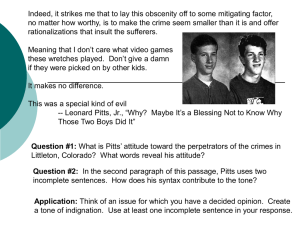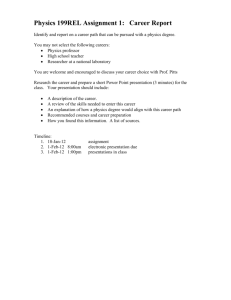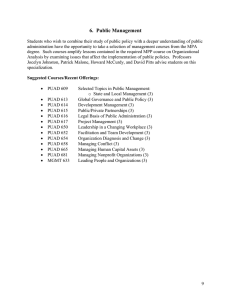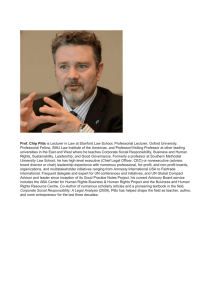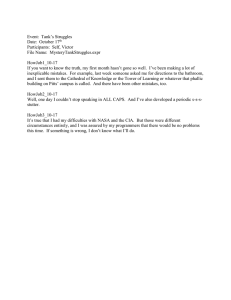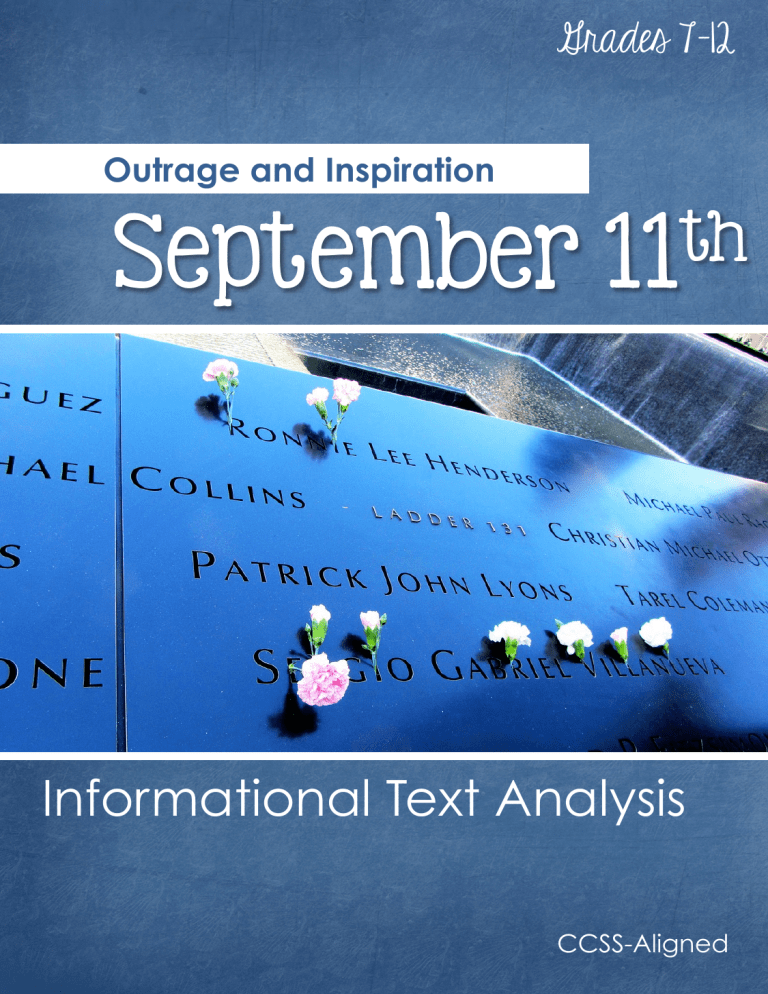
Grades 7-12 Outrage and Inspiration September th 11 Informational Text Analysis CCSS-Aligned Overview Thanks so much for your purchase! This packet can be used in part or whole to help your high school or advanced middle school students connect to the events of September 11th in a way that captures the shock, outrage, heartbreak, but also the inspiring unity and tenacity of the American psyche of the time. With this lesson, students read a now famous informational text by Pulitzer Prize winning journalist, Leonard Pitts Jr. of The Miami Herald. Written on 9/11, the essay was widely distributed through Internet chain mail the days and weeks after the events. Students will analyze the content and craft of the piece using the SOAPSTone strategy and through thought-provoking questions that can be used for discussion or writing assignments. Contents • A 1-2 day lesson plan with detailed instructions as well as the list of CCSS standards covered • A copy of the essay that students can annotate as they read • SOAPSTone graphic organizer in which students use a popular literary analysis strategy to clarify and organize their ideas • Thought-provoking analysis questions that can be used for class discussion or writing assignments • Writing reflection/summary activity in which students respond to the essay with their own writing • Multiple choice questions that can be used as a review, quiz or alternate assignment for struggling readers or ELLs • Detailed answer keys to generally make your life easier I have taught this lesson every year with my high schoolers, many of whom actually ask if they can keep the text to show their parents and friends. It’s incredibly gratifying to hear even my struggling readers talk about how much they enjoy this emotional piece and how it truly “gives them chills” to better understand the horror and heroism of that infamous day. The activities keep them engaged, and the questions get them thinking deeply and discussing matters of personal and national importance. It’s a lesson they talk about all year long! I hope you and your students enjoy. Lesson Objectives and Standards • • • • • • Determine a central idea of a text and analyze its development (CCSS.ELA-LITERACY.RI.9-10.2) Cite strong and thorough textual evidence to support analysis (CCSS.ELA-LITERACY.RI.9-10.1) Determine an author’s purpose in a text and analyze how the author uses rhetoric to advance it (CCSS.ELA-LITERACY.RI.9-10.6) Determine the meaning of words and phrases used in a text, analyze their connotative meanings and how they impact tone (CCSS.ELALITERACY.RI.9-10.4) Produce clear and coherent writing appropriate to task, purpose and audience (CCSS ELA-LITERACY. W.9-10.4) Initiate and participate effectively in a range of collaborative discussions (CCSS.ELA-LITERACY.SL.9-10.1) Warm-up Journal Prompt: • How have the events of September 11th and its aftermath changed our country? How have they shaped what it means to be an American? Consider the events of this day and the response of the government and the American people. Write about what it is like to live in a post 9/11 world. Main Activity • • • • • • Explain to the class that the essay they are about to read was written on 9/11 and published the next day in The Miami Herald. It is an emotional piece that so perfectly captured what Americans were feeling on that day, that it became an online sensation, sent chain-mail style through the Internet by countless readers. Read aloud to the class Leonard Pitts Jr.’s essay, “We’ll Go Forward from this Moment” as students read it silently. Ask students to underline any emotionally charged words or phrases they find as they read. They should also make note in the margin any questions they have or points they believe are worthy of discussion. After reading, ask students to work in pairs or small groups to complete the SOAPSTone analysis graphic organizer. This is an excellent strategy for students to use at the start of any literary analysis to clarify and organize their ideas in preparation for discussion or writing. When complete, discuss findings with class. In pairs or small groups, have students answer the discussion/study questions provided. These are intended to provoke thoughtful, meaningful class discussions. As a summary activity, ask students to complete their own letter to the terrorists of 9/11 on the reflection sheet provided. For quick assessment, review, quiz or alternate assignment for struggling readers or ELLs, have them complete the multiple choice questions. Note: If time does not permit you to complete all the activities, you may pick and choose among them. I often concentrate on the discussion questions as a lesson focal point. We’ll go forward from this moment By Leonard Pitts Jr. First printed in The Miami Herald on September 12, 2001 It’s my job to have something to say. They pay me to tease shades of meaning from social and cultural issues, to provide words that help make sense of that which troubles the American soul. But in this moment of airless shock when hot tears sting disbelieving eyes, the only thing I can find to say, the only words that seem to fit, must be addressed to the unknown author of this suffering. You monster. You beast. You unspeakable bastard. What lesson did you hope to teach us by your coward’s attack on our World Trade Center, our Pentagon, us? What was it you hoped we would learn? Whatever it was, please know that you failed. Did you want us to respect your cause? You just damned your cause. Did you want to make us fear? You just steeled our resolve. Did you want to tear us apart? You just brought us together. Let me tell you about my people. We are a vast and quarrelsome family, a family rent by racial, cultural, political and class division, but a family nonetheless. We’re frivolous, yes, capable of expending tremendous emotional energy on pop cultural minutiae -- a singer’s revealing dress, a ball team’s misfortune, a cartoon mouse. We’re wealthy, too, spoiled by the ready availability of trinkets and material goods, and maybe because of that, we walk through life with a certain sense of blithe entitlement. We are fundamentally decent, though -- peace-loving and compassionate. We struggle to know the right thing and to do it. And we are, the overwhelming majority of us, people of faith, believers in a just and loving God. Some people -- you, perhaps -- think that any or all of this makes us weak. You’re mistaken. We are not weak. Indeed, we are strong in ways that cannot be measured by arsenals. Yes, we’re in pain now. We are in mourning and we are in shock. We’re still grappling with the unreality of the awful thing you did, still working to make ourselves understand that this isn’t a special effect from some Hollywood blockbuster, isn’t the plot development from a Tom Clancy novel. Both in terms of the awful scope of its ambition and the probable final death toll, your attacks are likely to go down as the worst acts of terrorism in the history of the United States and indeed, the history of the world. You’ve bloodied us as we have never been bloodied before. But there’s a gulf of difference between making us bloody and making us fall. This is the lesson Japan was taught to its bitter sorrow the last time anyone hit us this hard, the last time anyone brought us such abrupt and monumental pain. When roused, we are righteous in our outrage, terrible in our force. When provoked by this level of barbarism, we will bear any suffering, pay any cost, go to any length, in the pursuit of justice. I tell you this without fear of contradiction. I know my people, as you, I think, do not. What I know reassures me. It also causes me to tremble with dread of the future. In days to come, there will be recrimination and accusation, fingers pointing to determine whose failure allowed this to happen and what can be done to prevent it from happening again. There will be heightened security, misguided talk of revoking basic freedoms. We’ll go forward from this moment sobered, chastened, sad. But determined, too. Unimaginably determined. You see, there is steel beneath this velvet. That aspect of our character is seldom understood by people who don’t know us well. On this day, the family’s bickering is put on hold. As Americans we will weep, as Americans we will mourn, and as Americans, we will rise in defense of all that we cherish. Still, I keep wondering what it was you hoped to teach us. It occurs to me that maybe you just wanted us to know the depths of your hatred. If that’s the case, consider the message received. And take this message in exchange: You don’t know my people. You don’t know what we’re about. You don’t know what you just started. But you’re about to learn. Name:______________________________________________________________________ Period: ____________ “We’ll go forward from this moment…” Literary Analysis: SOAPSTone Method Leonard Pitts Jr. SOAPSTone (an acronym for Speaker, Occasion, Audience, Purpose, Subject, and Tone) is an excellent strategy to begin analyzing any piece of literature, allowing your to clarify and organize your ideas before writing or class discussion. Answer the questions below, citing evidence from the text to support your responses. Response Speaker Who is the speaker? Is he credible? Occasion What is the time and place; what situation prompted the writing? Audience Who is the audience for the writing? What assumptions exist about the audience? Purpose What is the purpose behind the text? What is the writer’s goal? Subject What is the topic, content and ideas of the text? Is there more than one? Tone What is the author’s attitude? What use of diction and details convey this view? Evidence from Text Name:______________________________________________________________________ Period: ____________ “We’ll go forward from this moment…” Leonard Pitts Jr. Discussion/Study Questions 1. Pitts begins his piece with the line: “It’s my job to have something to say.” Why do you suppose he starts with such a statement? What can you infer about what he is feeling at the moment? 2. In the eighth paragraph, the author suggests that, as Americans, we “expend tremendous emotional energy on pop cultural minutiae.” What is the meaning of the word “minutiae”? (You may use a dictionary.) Do you agree with his statement? Explain, providing examples. 3. Pitts uses the rhetorical strategy of repetition throughout his column. Find at least two examples and write them here. Why do you think he uses this strategy? 4. In paragraph nine, Pitts states that we Americans “walk through life with a certain sense of blithe entitlement.” What does he mean by “blithe entitlement”? Is this an accurate critique? Why or why not? 5. “We’ll Go Forward from this Moment” is an emotionally charged piece of writing, achieved largely through Pitts’ strongly connotative word choices. Which words and phrases have the strongest connotations? How do they add to the tone of the piece? 6. What is the central idea of this passage? Summarize it in your own words. Then, find one sentence in the passage that best summarizes the author’s thesis. 7. In the aftermath of 9/11, tens of thousands of readers deluged Pitts with emails, inspired by this column. In fact, the piece became an Internet sensation, sent chain-letter-style by countless readers. Why do you think this piece, that is filled with indignation, is so inspiring to so many? Name: ________________________________________________________ Period: __________ Summary/Reflection “We’ll go forward from this moment…” QUESTION: Leonard Pitts Jr. If you had the opportunity to write a letter to the terrorists of 9/11, what would you say? Write your letter below. Name:______________________________________________________________________ Period: ____________ “We’ll go forward from this moment…” Leonard Pitts Jr. Multiple Choice Review 1. a. b. c. d. Who is the author directly addressing in this passage? The American public. The terrorists who committed the atrocities on 9/11. Americans who lost their lives and loved ones on 9/11. Politicians who were forced to make decisions on how to respond to the tragedy. 2. a. b. c. d. Which of the following best describes the author’s tone in the passage? Saddened and hopeless. Saddened and outraged, but resolved. Confused but happy. Frightened and hateful. 3. In the eighth paragraph in which the author says that we “expend tremendous emotional energy on pop cultural minutiae,” what is the meaning of the word “minutiae”? a. Small, trifling, meaningless matters. b. Important events of the day. c. Passing minutes of time. d. Major personal tragedies. 4. In paragraph nine, the author states, “we walk through life with a certain sense of blithe entitlement.” What does he mean by “blithe entitlement”? a. An angry, bitter attitude towards others. b. A confused state of mind. c. A painful feeling of remorse. d. A carefree sense that we deserve to have whatever we want. 5. a. b. c. d. Why does the author “tremble with dread of the future” near the end of the passage? He is afraid of what the terrorists will do next. He is filled with hatred. He knows many more lives will be lost in the pursuit of justice. He does not have faith in the decisions of our leaders on how they will respond. 6. a. b. c. d. What is the main idea of this passage? The events of 9/11 have forever changed the United States for the worse. America is an imperfect country, full of bickering and spoiled citizens. Despite the atrocities of 9/11, Americans will together rise above the tragedy and move on. Americans will never fully understand the lessons the terrorists attempted to teach us on 9/11. ANSWER KEY: Answers will vary. Literary Analysis: “We’ll go forward from this moment…” SOAPSTone Method Response Leonard Pitts Jr. Evidence from Text Speaker As a Pulitzer Prize winning columnist for The Miami Herald, Leonard Pitts Jr. is a highly credible speaker. Pitts begins the piece by stating his role as a journalist: “It’s my job to have something to say.” He points out that he is paid to “tease shades of meaning from social and cultural issues...” Occasion Pitts wrote the piece on September 11th, 2001, in response to the terrorist attacks on the World Trade Center and Pentagon. Speaking directly to the terrorists, Pitt asks them what they hope America would learn by their “coward’s attack on our World Trade Center, Pentagon, us?” Audience Pitt directly addresses the terrorists themselves; however, his audience is also the American people who are in emotional turmoil after the attacks. Pitt speaks directly to the terrorist, “the unknown author of this suffering,” calling him “monster, “”beast” and “bastard.” But in continually using the word “we” throughout, he demonstrates that his wider audience is the American public. Purpose Pitt expresses the anger and heartbreak felt by all Americans; his purpose is to build their confidence and determination to unite and rise above the tragedy. Pitt refers to Americans as a ”family,” admittedly “quarrelsome,” but also “unimaginably determined.” He speaks metaphorically of their strength, the “steel beneath this velvet.” In a tone of increasing confidence, he states that, “as Americans, we will rise in defense all all that we cherish.” Subject Attempting to first make sense of the “unreality” of the tragedy, the essay champions the character of the American people, indicating they are strong in ways that the terrorists will never understand and will go to “every length” to pursue justice. Pitt begins with a litany of questions for the terrorist, asking what they “hoped we would learn.” He then shifts his focus to strength of Americans, who he believes the terrorists underestimate, saying, “we are strong in ways that cannot be measured in arsenals” and will bear “any suffering, pay any cost in the pursuit of justice.” Tone The tone of the essay is impassioned and outraged, while at the same time uplifting and inspirational. Pitts’ passionate though controlled hostility is clear in his strongly connotative word choices such as “monster,” “bloodied,” and “barbarism.” Yet his words also soar with inspiration with such choice phrases as, “as Americans, we will rise to the challenge of all that we cherish.” Who is the speaker? Is he credible? What is the time and place; what situation prompted the writing? Who is the audience for the writing? What assumptions exist about the audience? What is the purpose behind the text? What is the writer’s goal? What is the topic, content and ideas of the text? Is there more than one? What is the author’s attitude? What use of diction and details convey this view? ANSWER KEY: Answers will vary. “We’ll go forward from this moment…” Leonard Pitts Jr. Discussion/Study Questions 1. Pitts begins his essay with the line: “It’s my job to have something to say.” Why do you suppose he starts with such a statement? What can you infer about what he is feeling at the moment? In this first line, “It’s my job to have something to say,” Pitts expresses the utter disbelief that America is feeling after the attacks that leaves him, a well-respected journalist who makes a living through words and commentary, virtually speechless. Instead, he experiences a “moment of airless shock” when his words—and even his breath—is taken away by the atrocities that have just occurred. 2. In the eighth paragraph, the author suggests that, as Americans, we “expend tremendous emotional energy on pop cultural minutiae.” What is the meaning of the word “minutiae”? (You may use a dictionary.) Do you agree with his statement? Explain, providing examples. Minutiae refers to trivial, minor matters or details, such remembering a baseball players batting average down to the decimal point. Cultural minutiae, then, would refer to the trifling, meaningless events and figures in our lives over which we obsess as a country. Answers will vary, but many would agree that Americans are preoccupied with “cultural minutiae.” Examples include national conversations over Hilary Clinton’s hairstyle vs. her stance on issues or our obsession with photos of Kim Kardashian’s rear end that sweep across the internet. 3. Pitts uses the rhetorical strategy of repetition throughout his column. Find at least two examples and write them here. Why do you think he uses this strategy? Pitts uses repetition often in his essay to add an appealing rhythm to his language, but more importantly, to emphasize certain ideas. An example is near the beginning of the piece in which he wonders what the goals were of the terrorists’ attack. He repeats, “Did you want…” “Did you want…” Did you want…” Here, his use of repetition demonstrates his grappling to make sense of the horror. With each repetition, his response is a confident, rebellious juxtaposition to the question. For example: “Did you want to tear us apart? You just brought us together.” Another example is towards the end of the essay in the line: “As Americans we will weep, as Americans we will mourn, and as Americans, we will rise in defense of all that we cherish.” Here, his repetition of the term “as Americans” demonstrates the feeling of unity he trying to achieve through his writing. 4. In paragraph nine, Pitts states that we Americans “walk through life with a certain sense of blithe entitlement.” What does he mean by “blithe entitlement”? Is this an accurate critique? Why or why not? The “blithe entitlement” that Pitts describes is a thoughtlessly carefree feeling in which we think we deserve everything we want. Answers will vary, but many would agree we Americans share this trait, as demonstrated by our tendency to feel that the rules don’t apply to us (driving over the speed limit, for example, or changing lanes without a signal), or that we deserve something we haven’t earned, such as an A we haven’t worked for or downloading music we haven’t paid for. ANSWER KEY: Answers will vary. “We’ll go forward from this moment…” Leonard Pitts Jr. Discussion/Study Questions 5. “We’ll go forward from this moment” is an emotionally charged piece of writing, achieved largely through Pitts’ strongly connotative word choices. Which words and phrases have the strongest connotations? How do they add to the tone of the piece? Pitts use of strongly connotative word choices help to set the impassioned, angry but inspired tone of the piece. His righteous indignation is demonstrated through word choices such as “monster,” “beast” and “bastard” when referring to the terrorists. It is also shown in his use of emotionally charged terms such a “bloodied,” “bitter,” and “barbarism.” At the same time, the essay inspires the reader with strength and determination through terms such as “steeled our resolve,” “unimaginably determined,” and “rise in defense of all that we cherish.” 6. What is the central idea of this essay? Summarize it in your own words. Then, find one sentence within that best summarizes the author’s thesis. The central idea of this essay is that despite the atrocities of September 11th, Americans will together rise above the tragedy and move on. This is best summarized in the author’s statement near the end of the piece, “As Americans we will weep, as Americans we will mourn, and as Americans, we will rise in defense of all that we cherish.” 6. In the aftermath of 9/11, tens of thousands of readers deluged Pitts with emails, inspired by this column. In fact, the piece became an Internet sensation, sent chainmail-style by countless readers. Why do you think this piece, that is filled with indignation, is so inspiring to so many? Answers will vary, but readers in general connect with Pitts’ essay because it so eloquently captures the feeling of shock, pain, anger and disbelief Americans felt immediately after the events of 9/11. Others may say that his emotionally charged piece, that so honestly characterizes our country’s shortcomings, but even more so, our strengths in the face of disaster, makes us feel united as a nation and proud to be American. - ANSWER KEY “We’ll go forward from this moment…” Leonard Pitts Jr. Multiple Choice Review 1. a. b. c. d. Who is the author directly addressing in this passage? The American public. The terrorists who committed the atrocities on 9/11. Americans who lost their lives and loved ones on 9/11. Politicians who were forced to make decisions on how to respond to the tragedy. 2. a. b. c. d. Which of the following best describes the author’s tone in the passage? Passionate but hopeless. Saddened and outraged, but resolved. Confused but happy. Frightened and hateful. 3. In the eighth paragraph in which the author says that we “expend tremendous emotional energy on pop cultural minutiae,” what is the meaning of the word “minutiae?” a. Small, trifling, meaningless matters. b. Important events of the day. c. Passing minutes of time. d. Major personal tragedies. 4. In paragraph nine, the author states, “we walk through life with a certain sense of blithe entitlement.” What does he mean by “blithe entitlement”? a. An angry, bitter attitude towards others. b. A confused state of mind. c. A painful feeling of remorse. d. A carefree sense that we deserve to have whatever we want. 5. a. b. c. d. Why does the author “tremble with dread of the future” near the end of the passage? He is afraid of what the terrorists will do next. He is filled with hatred. He knows many more lives will be lost in the pursuit of justice. He does not have faith in the decisions of our leaders on how they will respond. 6. a. b. c. d. What is the main idea of this passage? The events of 9/11 have forever changed the United States for the worse. America is an imperfect country, full of bickering and spoiled citizens. Despite the atrocities of 9/11, Americans will together rise above the tragedy and move on. Americans will never fully understand the lessons the terrorists attempted to teach us on 9/11. Thank You! Thank you so much for purchasing this product. I hope you and your students find it engaging, and that it helps to improve the skills and confidence of your young readers and writers. As always, I sincerely appreciate your support on TeachersPayTeachers! You may also like: Short Story Close Reading Mega-Bundle Letter from Birmingham Jail Close Reading & Rhetorical Analysis Bundle Vocabular Pack: 20+ Games, Activities & Printables 30+ Fun Book Report Alternatives and Assignments Introduction to the Language of Shakespeare Bundle A special thanks to KG Fonts for the typefaces used in this packet! For more great products for your middle and high school classroom, visit my store here: Mrs. McLeod’s Classroom Visit my blog and Facebook page for even more ideas, freebies and special offers. Thanks again for your support! Carla McLeod
